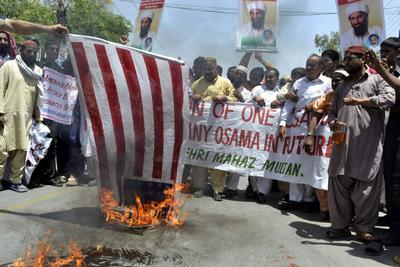Since 9/11, the United States has tried to win Pakistani ‘hearts and minds’, recognising (eventually) that Pakistan was the lynchpin in the whole US counterterrorism operation in Afghanistan. To win hearts, the United States committed to spending billions of dollars in aid money over the coming few years. To win minds, the US provided millions, if not billions, in military aid and training to assist the Pakistan military to protect its people.
Has it worked? Pakistanis continue to be staunchly anti-American. According to the Pew Research Centre’s 2010 survey of Pakistan, 68 per cent of Pakistanis consider the US an enemy and express concern that the US could become a military threat. This number is likely to increase as it becomes clear that Pakistan was not involved and had no prior knowledge of the strike against Bin Laden. Interestingly, the Pew survey also revealed that 26 per cent of Pakistanis believe that the US gives them ‘very little’ or no aid. The hearts and minds policy is not really working in Pakistan and needs to be rethought.
So what next then?
Three main problems face the United States over the coming months with regard to its involvement in the region and need to inform its recalibration of policy in Pakistan.
The death of Bin Laden is not a game changer in Pakistan or Afghanistan. As much as the post 9/11 policy and US rhetoric has been built in terms of George W. Bush’s comments shortly after 9/11, reminiscent of an old Western film, that Bin Laden was ‘Wanted: Dead or Alive’, his death will not achieve the US goal to ‘disrupt, dismantle and defeat al Qaeda’. His death may disrupt the rank and file AQ members in the short-term as up and comers jostle for influence, but ultimately it strengthens the organisation’s resolve and enhances its recruitment capabilities. Kate Zernike and Michael T. Kaufman reported in the New York Times’ obituary of Bin Laden that his greatest hope was that if he died at the hands of the Americans, the Muslim world would rise up and defeat the nation that killed him. Maybe the Pakistanis are thankful to have not been involved, in light of this exhortation. The man and the myth may have been killed, but the machine that he built has not been eliminated. Bin Laden’s death will be a crucial component of whatever domestic narrative Obama constructs to convince the US public that they won the war against terrorism.
The manner in which Bin Laden was killed and the nationality of his executioners will create more problems for Pakistan’s already fragile civilian government. The raid in Abbottabad raises sovereignty issues for Pakistan. Former President Pervez Musharraf has spoken out against the attack saying that, while the death of Bin Laden was positive, he considered the US action a violation of sovereignty.
The headline in Pakistani newspaper Dawn the day after Bin Laden’s death, suggested that he may have been killed by his own bodyguard rather than US troops. To the United States and the West this is beside the point. Bin Laden is dead and that’s that, it doesn’t matter who fired the gun. To some Pakistanis this might give satisfaction that the US didn’t dispose of the man who has caused so much grief to their country. Pakistanis blame the United States for the innumerable negative social, economic and security consequences of the ‘War on Terror’ (that Pakistan had little choice but to join in the climate of ‘you are with us or you are against us’) and has had to deal with following 9/11.
There is likely to be a permanent impact on the bilateral relationship between Pakistan and the United States that may see Pakistan move closer towards China and Afghanistan (to counter India’s growing influence) as a result. This should occupy US diplomats as they scramble to smooth things over with Pakistan, particularly in light of recent statements by Prime Minister Gilani to President Karzai that Afghanistan should dump the United States as an ally given it has failed both of their countries.
The United States needs to tone it down. The death of Osama Bin Laden at the hands of US special forces is something to be thankful for, even celebrate. But the jubilation on the streets of New York and Washington, which was beamed across the world, is going to alienate rather than endear Americans to the rest of the world, particularly the Muslim world.
The Obama Administration needs to be mindful how this reaction is playing out in the rest of the world and adapt its public messaging at home and abroad accordingly. Perceptions of hypocrisy will run riot as America’s celebrations of the death of a man who was responsible for thousands of deaths, not only in the United States, but across the world, are measured against the condemnation of Afghan and Iraqi celebrations of the deaths of US and coalition forces in their own countries. Osama killed our family, friends and fellow citizens, but the US and coalition forces have invaded and occupied Afghanistan and Iraq and killed thousands of their citizens over the past ten years. It is difficult to justify the celebration of any death without grossly offending another person, culture or country. This, above all, needs remembering.
Alicia Moullan is a doctoral candidate in the Crawford School at the ANU.

